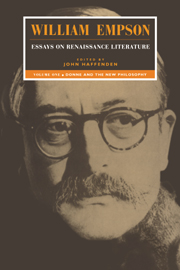Book contents
- Frontmatter
- Contents
- Preface
- Sources and acknowledgements
- Introduction by John Haffenden
- 1 Donne and the rhetorical tradition
- 2 Donne the space man
- 3 Donne in the new edition
- 4 Rescuing Donne
- 5 Donne's foresight
- 6 Copernicanism and the censor
- 7 Thomas Digges his infinite universe
- 8 Godwin's voyage to the moon
- Appendix on Galileo
- Notes
- Index
2 - Donne the space man
Published online by Cambridge University Press: 01 February 2010
- Frontmatter
- Contents
- Preface
- Sources and acknowledgements
- Introduction by John Haffenden
- 1 Donne and the rhetorical tradition
- 2 Donne the space man
- 3 Donne in the new edition
- 4 Rescuing Donne
- 5 Donne's foresight
- 6 Copernicanism and the censor
- 7 Thomas Digges his infinite universe
- 8 Godwin's voyage to the moon
- Appendix on Galileo
- Notes
- Index
Summary
Why then should witlesse man so much misweene That nothing is, but that which he hath seene? What if within the Moones faire shining spheare? What if in every other starre unseene Of other worldes he happily should heare? He wonder would much more: yet such to some appeare.
(Proem to Book II, The Faerie Queene)Present-day writers on Donne, I have recently come to realise, have never heard of a belief about him which, twenty or thirty years ago, I thought was being taken for granted. I can't believe I invented it; it was part of the atmosphere in which I grew up as an undergraduate at Cambridge. Nor, so far as I can gather, has it been refuted (though there are two old magazine articles, regularly listed in footnotes, which I have looked up and will discuss); I fancy the detailed evidence for it did not get collected because that seemed unnecessary. I myself, being concerned with verbal analysis, thought I could take this part of Donne's mind as already known; and all the more, of course, when I was imitating it in my own poems, which I did with earnest conviction. The current of fashion or endeavour has now changed its direction, and a patient effort to put the case for the older view seems timely. The text of the poems, I think, gives strong evidence, but perhaps only in a literary way; that is, the poetry becomes better, both more imaginative and more coherent, if the hints implying this opinion are allowed the weight due to a consistent use.
- Type
- Chapter
- Information
- William Empson: Essays on Renaissance Literature , pp. 78 - 128Publisher: Cambridge University PressPrint publication year: 1993
- 3
- Cited by

